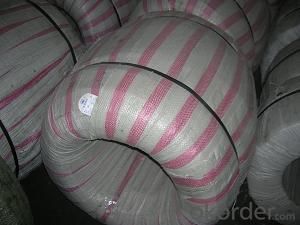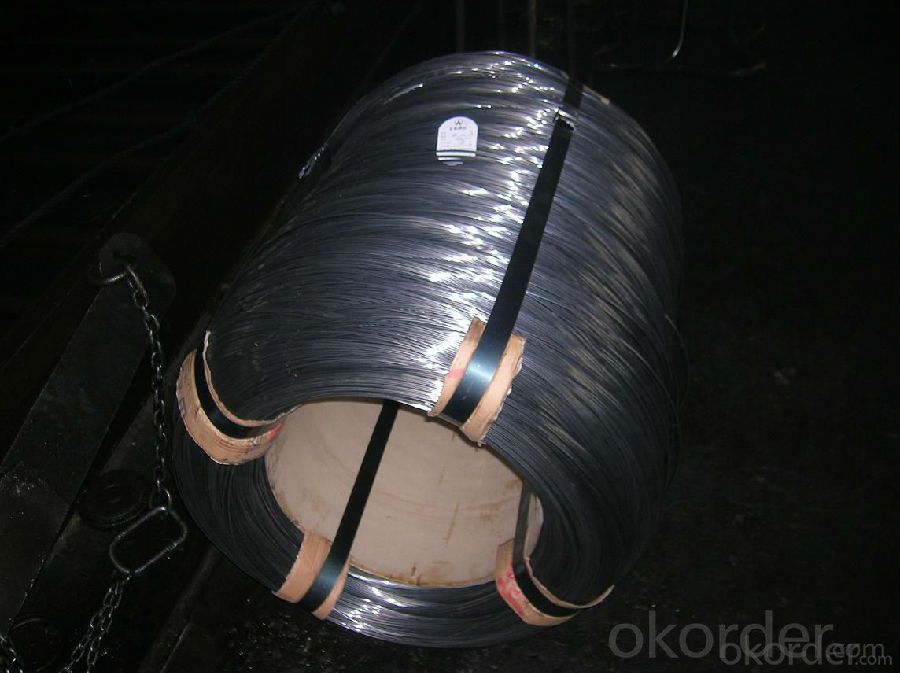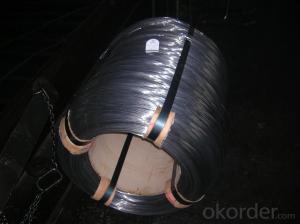COLD SPRING STEEL WIRE
- Loading Port:
- China Main Port
- Payment Terms:
- TT OR LC
- Min Order Qty:
- -
- Supply Capability:
- -
OKorder Service Pledge
Quality Product, Order Online Tracking, Timely Delivery
OKorder Financial Service
Credit Rating, Credit Services, Credit Purchasing
You Might Also Like
Steel grade should be 82B,65Mn,70#,72B,45#,M10etc.diameter range from 0.4 to 2.0mm,package can following customer's required.currently mainly export to SAUDI ARABIA and INDIA.
we can satisfying market demands constantly and empoldering new product;can offering wires according to German standards(DIN17223/1,DIN17223/2),American standards(ASTM A227/A227M,ASTM A228/228M,ASTM 231/A231M,ASTM A401/401M),Japanese standards(JIS G3521,JIS G3522,JIS G3560,JIS G3561).and European standards(DIN EN10270-1,DIN10270-2)and so on.


- Q:What are the different renewable energy grades of special steel?
- The renewable energy industry commonly utilizes various grades of special steel. These grades are specifically engineered to endure the demanding conditions and needs of renewable energy applications. Stainless steel is one of the most prevalent grades of special steel employed in renewable energy. It is renowned for its ability to resist corrosion, making it an excellent choice for offshore wind turbines and solar panel frames that are exposed to moisture and saltwater. It is also utilized in geothermal power plants, where harsh temperatures and corrosive environments exist. Another grade of special steel utilized in renewable energy is high-strength low-alloy (HSLA) steel. This type of steel possesses a higher strength-to-weight ratio, rendering it suitable for lightweight structures requiring high strength, such as wind turbine towers or support structures for solar panels. Additionally, advanced high-strength steel (AHSS), commonly used in the automotive industry, can also find application in renewable energy. AHSS offers exceptional strength, durability, and impact resistance, making it ideal for components like wind turbine blades or gears. Furthermore, weathering steel is a grade of steel frequently employed in renewable energy applications exposed to outdoor elements. This type of steel develops a protective layer of rust, which prevents further corrosion and obviates the need for additional coatings. It is commonly found in solar panel support structures, transmission towers, and other outdoor equipment. Ultimately, the choice of the appropriate grade of special steel for a particular renewable energy application relies on several factors, including the type of renewable energy source, the installation environment, and the project's specific requirements.
- Q:How does special steel contribute to the manufacturing of turbine blades?
- Due to its unique properties and characteristics, special steel plays a critical role in the manufacturing of turbine blades. Turbine blades are exposed to extreme conditions, including high temperatures, high rotational speeds, and constant exposure to air and steam. To withstand these demanding operating conditions, materials must maintain their structural integrity and performance. Special steel, also known as superalloys, possesses exceptional mechanical properties, heat resistance, and corrosion resistance, making it an ideal choice for turbine blade manufacturing. Its high temperature resistance allows turbine blades to operate efficiently at elevated temperatures without significant deformation or failure. A key property of special steel is its ability to retain strength and hardness even at high temperatures. This is crucial for turbine blades, as they are constantly exposed to hot gases and steam in power generation applications. Special steel's resistance to creep ensures that turbine blades maintain their shape and structural integrity over time. Furthermore, special steel exhibits excellent corrosion resistance, protecting turbine blades from oxidation and other forms of degradation caused by the aggressive operating environment. This is particularly important in gas turbines, where the combustion process produces corrosive gases and particles that can damage the blades. Special steel's ability to resist oxidation and corrosion ensures the longevity and reliability of turbine blades. Moreover, special steel offers high strength-to-weight ratios, allowing for the design and manufacture of lightweight turbine blades. This lightweight characteristic improves aerodynamic performance and reduces energy consumption, as the blades require less force to rotate at high speeds. In conclusion, special steel significantly contributes to the manufacturing of turbine blades by providing exceptional mechanical properties, heat resistance, corrosion resistance, and lightweight characteristics. These properties ensure that turbine blades can withstand the extreme conditions of power generation applications, ultimately enhancing their performance, longevity, and overall efficiency.
- Q:Is special steel suitable for manufacturing precision components?
- Yes, special steel is highly suitable for manufacturing precision components. Special steel is a type of steel that is specifically engineered to possess exceptional properties, such as high strength, hardness, and resistance to wear, corrosion, and heat. These characteristics make it an ideal choice for manufacturing precision components that require tight tolerances, accuracy, and reliability. The inherent strength and hardness of special steel allow for the production of durable and long-lasting precision components. This is particularly important in industries where components are subjected to high stress and heavy loads, such as aerospace, automotive, and machinery manufacturing. Special steel's resistance to wear and corrosion ensures that the precision components can withstand harsh operating environments and maintain their functionality over time. Furthermore, special steel's excellent heat resistance makes it suitable for precision components that are exposed to elevated temperatures. This is especially relevant in industries like aerospace and power generation, where components need to withstand extreme heat without compromising their performance. Special steel also offers excellent machinability, which is crucial for manufacturing precision components with intricate designs and complex geometries. It can be easily shaped, cut, and formed into various shapes and sizes, allowing for the production of intricate and precise components. Overall, the unique properties of special steel, including high strength, hardness, resistance to wear, corrosion, and heat, as well as excellent machinability, make it highly suitable for manufacturing precision components. Its use ensures the production of high-quality components that meet the strict requirements of precision applications.
- Q:How does special steel contribute to the renewable energy equipment industry?
- The renewable energy equipment industry heavily relies on special steel, as it offers the strength, durability, and corrosion resistance needed for different components. Wind turbines, for instance, make extensive use of special steel alloys in their towers, blades, and gearboxes due to their high tensile strength and resistance to fatigue. This allows wind turbines to endure harsh environmental conditions and operate efficiently over extended periods. Additionally, special steel is widely employed in the manufacturing of solar power equipment. Stainless steel is often used to frame solar panels, providing excellent corrosion resistance and structural stability, ensuring their longevity and performance in outdoor settings. Moreover, special steel alloys are utilized in the production of solar trackers, enabling solar panels to track the sun's movement throughout the day and optimize energy generation. In the hydroelectric power industry, special steel is crucial in constructing turbine components such as blades, shafts, and casings. These components face high pressures, water flow, and abrasive wear, making the use of special steel essential for reliability and longevity. Furthermore, special steel is also integral in the production of energy storage systems like batteries and fuel cells. These technologies require materials with high conductivity, corrosion resistance, and mechanical strength, making special steel alloys ideal for their construction. Overall, special steel significantly contributes to the renewable energy equipment industry by providing the necessary strength, durability, and corrosion resistance for various components. Its utilization in wind turbines, solar panels, hydroelectric power systems, and energy storage technologies ensures the reliability and longevity of these equipment, ultimately promoting the growth and sustainability of the renewable energy sector.
- Q:How does special steel contribute to the creep resistance of products?
- Special steel contributes to the creep resistance of products by offering enhanced mechanical properties, such as high tensile strength and toughness, which help to resist deformation and damage over time. Additionally, the unique alloying elements and heat treatment processes used in special steel production further improve its resistance to creep, which is the gradual deformation occurring under prolonged exposure to high temperatures and constant stress. This makes special steel a reliable choice for applications where long-term structural integrity and durability are crucial, such as in high-temperature environments or load-bearing components.
- Q:What are the different coating techniques for special steel?
- There are several coating techniques commonly used for special steel, including electroplating, galvanizing, powder coating, thermal spraying, and chemical vapor deposition. Each technique offers unique advantages and is chosen based on the specific requirements of the steel, such as desired appearance, corrosion resistance, hardness, or wear resistance.
- Q:What are the different stamping grades of special steel?
- Various industries utilize different grades of special steel for stamping purposes. Some commonly used stamping grades are as follows: 1. Low Carbon Steel: This special steel grade is renowned for its exceptional formability and weldability. It finds extensive use in applications necessitating deep drawing or intricate bending. Moreover, low carbon steel is both cost-effective and readily available, making it a highly preferred choice for stamping processes. 2. High Strength Low Alloy (HSLA) Steel: HSLA steel, a type of special steel, incorporates small amounts of alloying elements like copper, nickel, or chromium. This grade offers superior strength and enhanced toughness compared to low carbon steel. It is commonly employed in automotive components, structural parts, and other applications demanding strength and durability. 3. Stainless Steel: Stainless steel is a corrosion-resistant special steel comprising a minimum of 10.5% chromium. It is frequently employed in stamping applications that require resistance against rust, staining, and corrosion. Stainless steel is available in various grades, such as 304, 316, and 430, each offering distinct levels of corrosion resistance and mechanical properties. 4. Tool Steel: Tool steel, a high-quality special steel, is specifically designed for applications necessitating resistance to wear, deformation, and high temperatures. It is commonly used in stamping dies, cutting tools, and other applications where hardness and toughness are vital. Notable tool steel grades include D2, A2, O1, and M2, among others. 5. Electrical Steel: Electrical steel, also known as silicon steel, is a special grade characterized by high magnetic permeability and low electrical conductivity. It finds application in stamping operations requiring efficient magnetic properties, such as transformers, motors, and generators. The aforementioned examples represent only a fraction of the stamping grades available in special steel. The selection of each grade depends on the specific requirements of the application, such as strength, corrosion resistance, magnetic properties, or formability.
- Q:What are the safety benefits of using special steel?
- Several safety benefits can be obtained in various applications by using special steel. One of the key advantages lies in its superior strength and durability when compared to traditional steel. Special steel is often specifically designed to withstand extreme conditions, such as high temperatures or corrosive environments, making it highly suitable for industries like aerospace, automotive, and oil and gas. The enhanced strength of special steel allows for the construction of structures that are safer and more reliable. It can bear heavy loads, thus reducing the risk of structural failures or collapses. This is particularly crucial in industries where the utmost importance is placed on the safety of workers, equipment, and the general public. Resistance to corrosion is another safety benefit of special steel. Corrosion has the potential to weaken structures and compromise their safety. Special steel is frequently alloyed with elements like chromium, nickel, or molybdenum, which provide excellent resistance to corrosion. This makes it suitable for applications in marine environments, chemical processing plants, or any setting where exposure to moisture or chemicals is a concern. Special steel is also renowned for its ability to maintain its mechanical properties at high temperatures. This makes it an excellent choice for applications where resistance to heat is crucial, such as in the construction of fire-resistant structures or in the manufacturing of industrial ovens and furnaces. By utilizing special steel in these applications, the risk of structural failure or fire-related accidents can be significantly reduced. Furthermore, special steel can offer improved resistance to fatigue, which is of utmost importance in applications subject to cyclic loading or vibration. Fatigue failure can occur when a material experiences repeated stress over time, resulting in cracks and eventual failure. Special steel can be engineered to possess excellent fatigue properties, thereby reducing the likelihood of unexpected failures and enhancing the overall safety of structures or equipment. In conclusion, the safety benefits of using special steel encompass enhanced strength, durability, resistance to corrosion, resistance to heat, and resistance to fatigue. These properties establish special steel as a reliable choice for industries where safety is a primary concern, ensuring the protection of workers, equipment, and the general public.
- Q:How does special steel contribute to the chemical processing industry?
- Special steel plays a crucial role in the chemical processing industry by offering a wide range of benefits that contribute to the overall efficiency and safety of various processes. Firstly, special steel is highly resistant to corrosion, which is an essential characteristic when dealing with corrosive chemicals. This resistance ensures that equipment and pipelines made from special steel can withstand the harsh chemical environments without deteriorating, leading to increased longevity and reduced maintenance costs. Furthermore, special steel provides excellent strength and durability, allowing it to withstand high temperatures and pressures commonly encountered in chemical processing. This strength ensures that equipment such as reactors, heat exchangers, and vessels can operate effectively under demanding conditions, minimizing the risk of failures or accidents. Special steel also offers excellent thermal conductivity, which is highly advantageous in heat transfer applications. This property allows for efficient heat exchange between different fluids, enhancing the overall energy efficiency of chemical processes. By facilitating the effective transfer of heat, special steel aids in optimizing the performance of equipment like condensers, boilers, and evaporators. In addition, special steel is often used in the construction of storage tanks and pipelines for the transportation and distribution of chemicals. Its high resistance to mechanical stress and impact makes it ideal for ensuring the safe containment and transportation of hazardous substances, reducing the risk of leaks or spills that could have serious environmental and safety consequences. Overall, the use of special steel in the chemical processing industry greatly contributes to the reliability, efficiency, and safety of various processes. Its corrosion resistance, strength, thermal conductivity, and durability make it an indispensable material for equipment and infrastructure, ensuring the smooth and secure operation of chemical processing plants.
- Q:How does special steel perform in high-temperature oxidation resistance?
- Special steel is specifically engineered to possess exceptional resistance to oxidation at high temperatures. This kind of steel incorporates alloying components like chromium, aluminum, and silicon, which generate a protective layer of oxide on the surface when subjected to extreme heat. This oxide layer acts as a barrier, preventing further oxidation and corrosion of the steel. The capacity of special steel to withstand high-temperature oxidation is of utmost importance in scenarios where the material is exposed to intense heat and oxidation, for instance, in gas turbines, heat exchangers, and furnaces. The protective oxide layer aids in preserving the strength and integrity of the steel, even under rigorous conditions. Moreover, special steel also showcases remarkable resistance to creep at high temperatures. Creep refers to the gradual distortion of a material under a consistent load and elevated temperatures. The distinctive composition of special steel grants it the ability to resist creep deformation, thereby enhancing its overall performance and dependability in environments with high temperatures. In conclusion, special steel exhibits exceptional performance in terms of resistance to high-temperature oxidation due to its alloying elements and the formation of a protective oxide layer. Its capability to resist oxidation and maintain its structural integrity at elevated temperatures makes it the preferred choice for numerous industrial applications.
1. Manufacturer Overview |
|
|---|---|
| Location | |
| Year Established | |
| Annual Output Value | |
| Main Markets | |
| Company Certifications | |
2. Manufacturer Certificates |
|
|---|---|
| a) Certification Name | |
| Range | |
| Reference | |
| Validity Period | |
3. Manufacturer Capability |
|
|---|---|
| a)Trade Capacity | |
| Nearest Port | |
| Export Percentage | |
| No.of Employees in Trade Department | |
| Language Spoken: | |
| b)Factory Information | |
| Factory Size: | |
| No. of Production Lines | |
| Contract Manufacturing | |
| Product Price Range | |
Send your message to us
COLD SPRING STEEL WIRE
- Loading Port:
- China Main Port
- Payment Terms:
- TT OR LC
- Min Order Qty:
- -
- Supply Capability:
- -
OKorder Service Pledge
Quality Product, Order Online Tracking, Timely Delivery
OKorder Financial Service
Credit Rating, Credit Services, Credit Purchasing
Similar products
New products
Hot products
Hot Searches
Related keywords





























